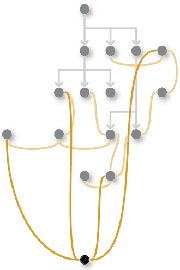Different users have different requirements. They treat and assess information in different ways. anyMeta therefore offers effective personalisation for editors and users. This personalisation has a number of possibilities.
A user profile can be attached to the site through metalinks: to sections of the site that he finds interesting
Every site built in anyMeta has an administration for the authorisation of the editors and employees. The administrator of the site decides who is authorised to add information to the site; who can edit current information; who can publish and who can change the navigation.
These competences can be given to individuals or groups and can be limited to certain parts of the site. The users of an anyMeta site can be classified in target groups such as ‘business’, ‘personal’, ‘children’ or ‘technical’. The site shows the user relevant information; it leaves out the rest or puts it in the background.
In the most advanced case the users can personalise the information themselves. They can indicate which information they are interested in. This information will be saved in their profile according to the meta-data system of the site. anyMeta considers their profile in the search for related information and links. This personalisation even works in the search function: the weight of the search results depends on the preferences of the user. Based on the same profile the user can subscribe to a personalised newsletter.
You can also give rights to all the site’s users to add material to the site. This can be reduced to a personal ‘homepage’ but it’s also possible to group personal additions such as experiences (for a story based site) or professional knowledge (intranet) through matching on theme, keyword or location.
Example. A site on history: a user indicates that he is interested in Amsterdam. He gets links to archways in Amsterdam when he is looking at an article on midieval archways
in Leiden. When this user searches on the term ‘poetry’, he will find poems on Amsterdam at the top of the list of found items.
